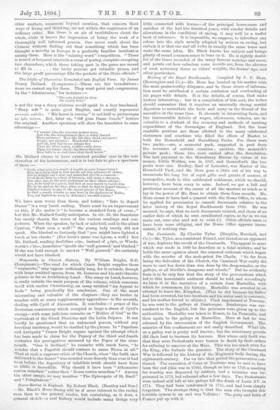History of the Royal Buckhounds. Compiled by J. P. IIore.
(Remington and Co.)—Mr. Here has hunted up his matter with the most praiseworthy diligence, and to these stores of informa- tion must be attributed a certain confusion and overloading of his pages with details. It is the details, of course, that make history interesting ; but in a compilation of this sort, the writer should remember that it requires an unusually strong mental digestion to assimilate the facts and carry on the thread of the narrative at the same time. It abounds in interesting facts, and the innumerable details of wages, allowances, salaries, are in- valuable to a student of the economy and methods of meeting expenditure of the Sovereigns of England. Not the least readable portions are those allotted to the many celebrated statesmen and courtiers who filled the offices of Master to both the Household and Hereditary Packs. For there were two packs,—one, a manorial pack, supported in part from the revenues of certain counties ; another, the monarch's private pack ; these two were united after the Revolution. The last payment to the Hereditary Master by virtue of his manor, Little Weldon, was in 1707, and thenceforth the two packs were one. Dudley, Earl of Leicester, was Master of the Household Pack, and Mr. Here goes a little out of his way to enumerate the long list of royal gifts and grants of manors, of monopolies, made to this celebrated nobleman, which we should, however, have been sorry to miss. Indeed, we get a full and particular account of the career of all the masters as much as it lay in the power of Mr. Here to obtain them from records. Mr. Hose seems to have had a quarrel with the Home Office, to whom he applied for permission to consult documents relative to the later history of the Royal Buckhounds from 1760. He was assured, he says, that no such documents existed, and those of an earlier date of which he sent certificated copies, as far as we can make out, were also said not to exist (?) Other officials seem to have been more obliging, and the Home Office appears incon- sistent, if nothing else.

































 Previous page
Previous page